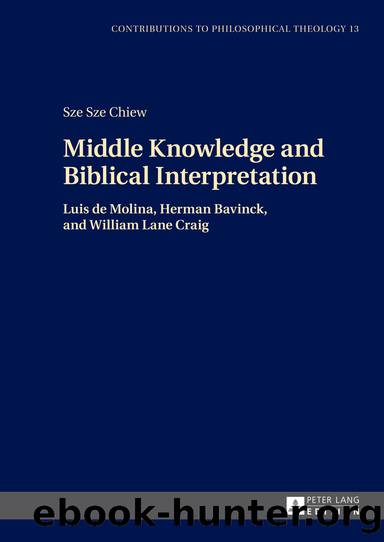Middle Knowledge and Biblical Interpretation by Chiew Sze Sze

Author:Chiew, Sze Sze
Language: eng
Format: epub
Publisher: Peter Lang AG
Published: 2016-06-11T00:00:00+00:00
4.4.1 Objections of Theoretical Issues
As to theory, there are two main objections:46 (1) there neither are nor can be true counterfactuals of freedom (all are either false, or true or false) because they fail to be grounded in reality (the âgroundingâ objection); (2) there neither are nor can be true counterfactuals of freedom prior to Godâs decision, because their truth value depends on the actual created world.47 Apparently, both of these objections seriously challenge the truth value of the counterfactual propositions that are central to Molinism. Hence, much has been written about the âgroundingâ objection and its contention has been modified and transformed into different versions over the years. Generally, it is argued that there neither are nor can be contingently true counterfactuals of freedom because there is nothing in reality that âgroundsâ their truth or makes them true. Counterfactuals of freedom or counterfactual statements about what a person would freely have done under â 119 | 120 â different circumstances cannot be true, because they are just statements about events or actions that will never exist, or they are statements about creatures that will never exist. Since they are conditionals of only what would exist if the situation were different, they do not correspond to reality and hence cannot be true. Who or what grounds their truth becomes an unanswerable question as well.48
On the other hand, it is also pointed out that the premises on which Molinism stands, taken together with other principles, establish a more complicated anti-Molinist argument. Since in Molinism, we freely do something only if we are able to do otherwise in the same circumstance, we in fact have no counterfactual power over any true antecedents and their consequents, so none of our actions is or would be free.49 If this is the case, there are no true counterfactuals of freedom. In other words, in Molinism, we do not âbring aboutâ the truth of any counterfactuals of freedom about us. This argument is initiated by Hasker and is commonly known as the âbring aboutâ argument. Moreover, if we assume that counterfactuals do have truth value, their existence turns out to be incompatible with libertarian freedom as well. This is because if any counterfactuals of freedom were true, they would be part of, or entailed in, the âfixedâ history of the world prior to our choices and actions (since they have already had causal consequence), so we would have no â 120 | 121 â control of any sort over them.50 If this is the case, we would not be the ultimate source of any of our choices and actions, and so we would not be free. While Molinists claim to be the champion of libertarian freedom, they are committed to principles that are inconsistent with it, so the objection goes.
Craig gives three reasons for holding that counterfactual statements can be true. First, âvery little reflection is required to reveal how pervasive and indispensable a role such counterfactuals play in rational conduct and planning,â51 since âwe use
Download
This site does not store any files on its server. We only index and link to content provided by other sites. Please contact the content providers to delete copyright contents if any and email us, we'll remove relevant links or contents immediately.
Fangirl by Rainbow Rowell(9249)
How to Bang a Billionaire by Alexis Hall(8154)
Wonder by R. J. Palacio(8108)
The Thirst by Nesbo Jo(6943)
The Space Between by Michelle L. Teichman(6939)
Assassin’s Fate by Robin Hobb(6216)
Wiseguy by Nicholas Pileggi(5782)
The Night Circus by Erin Morgenstern(5220)
Paper Towns by Green John(5188)
The Kite Runner by Khaled Hosseini(5178)
Bittersweet (True North #1) by Sarina Bowen(4845)
Gerald's Game by Stephen King(4653)
Too Much and Not the Mood by Durga Chew-Bose(4347)
Pillow Thoughts by Courtney Peppernell(4283)
Goodbye Paradise(3809)
Twelve Days of Christmas by Debbie Macomber(3567)
Good by S. Walden(3554)
The Rosie Effect by Graeme Simsion(3465)
The Cellar by Natasha Preston(3342)
